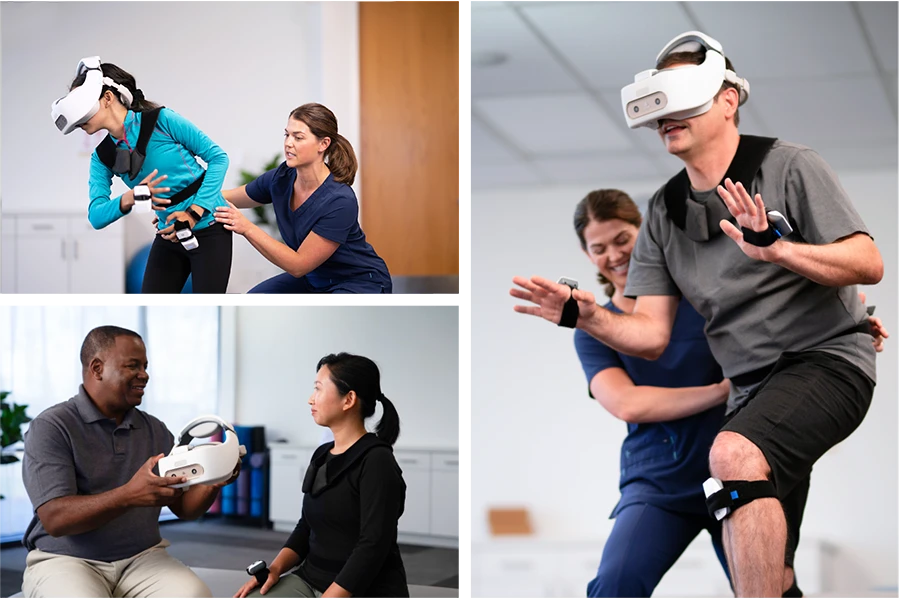
VR Revolutionizing Rehab: Beyond Physical Limits
In the realm of physical rehabilitation, Virtual Reality (VR) is proving to be a transformative force, pushing the boundaries of traditional therapy. This immersive technology is not just a tool; it’s a catalyst for reshaping how individuals navigate the path to recovery, surpassing physical limitations in the process.
Embracing Immersive Therapy: The VR Advantage
VR for physical rehabilitation introduces a paradigm shift in therapy approaches. Traditional rehabilitation exercises can often be monotonous and repetitive, leading to reduced patient engagement. VR steps in to inject a new level of excitement by transforming exercises into immersive activities. This not only enhances patient motivation but also makes the rehabilitation process more engaging and enjoyable.
Personalized Rehabilitation Journeys: Tailored for Success
One of the standout features of VR in physical rehabilitation is its ability to personalize therapy sessions. Each patient’s rehabilitation needs are unique, and VR allows for tailored experiences. From adapting difficulty levels to focusing on specific areas of improvement, VR technology ensures that rehabilitation journeys are customized for optimal results.
Interactive Exercise Modules: Making Rehab Fun
Rehabilitation often involves a series of exercises aimed at improving mobility, strength, and coordination. VR takes these exercises to the next level by turning them into interactive modules. Patients can find themselves immersed in virtual worlds, engaging in activities that mimic real-life movements. This not only adds an element of fun but also enhances the effectiveness of therapeutic exercises.
Simulating Real-World Challenges: Practical Rehabilitation
VR’s ability to simulate real-world challenges is a game-changer in physical rehabilitation. Patients can navigate virtual environments that mirror daily life scenarios, such as climbing stairs, reaching for objects, or walking on uneven surfaces. This practical approach ensures that rehabilitation extends beyond the therapy room, preparing individuals for the challenges they may encounter in their day-to-day lives.
Enhancing Motor Skills: Precision in Motion
For individuals relearning motor skills, precision is paramount. VR provides a platform for fine-tuning motor skills with remarkable precision. Whether it’s grasping objects, controlling movements, or refining coordination, VR exercises offer a level of detail and accuracy that is instrumental in the rehabilitation process.
Cognitive Rehabilitation: Beyond the Physical Realm
VR for physical rehabilitation extends its benefits beyond the physical realm to cognitive rehabilitation. Engaging virtual scenarios can stimulate cognitive functions, providing exercises for memory, attention, and problem-solving. This dual-focus on both physical and cognitive aspects enhances the holistic nature of VR-based rehabilitation programs.
Remote Rehabilitation: Breaking Location Barriers
The integration of VR in rehabilitation goes beyond the confines of the therapy room. With the advent of remote rehabilitation solutions, patients can continue their therapy from the comfort of their homes. VR for physical rehabilitation becomes a tool for extending care, breaking location barriers, and ensuring that individuals have access to ongoing support in their recovery journey.
Data-Driven Progress Tracking: Informed Rehabilitation
VR technology comes with the added advantage of data-driven progress tracking. Therapists can monitor and analyze a patient’s performance within the virtual environment, gaining valuable insights into their progress. This data-driven approach enables therapists to make informed decisions, adapt rehabilitation plans, and celebrate milestones achieved during the recovery process.
Empowering Independence: A Future in Motion
To delve deeper into the transformative world of VR for physical rehabilitation, explore VR for physical rehabilitation and witness firsthand how this immersive technology is shaping the future of rehabilitation. It’s not just about overcoming physical challenges; it’s about empowering individuals to reclaim their independence and embark on a journey beyond the confines of traditional therapy.
